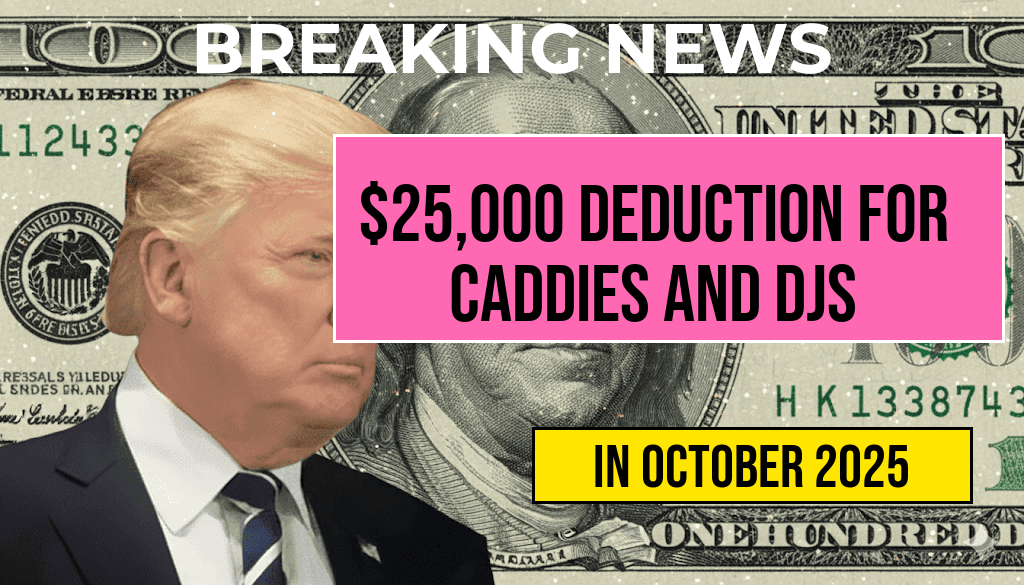In a significant move for the hospitality and entertainment sectors, the Internal Revenue Service (IRS) has announced a new initiative that allows golf caddies and DJs to deduct up to $25,000 in tips from their taxable income. This policy aims to alleviate the financial burden on service professionals who often rely on gratuities as a substantial part of their income. The change is expected to provide financial relief to thousands of workers across the country, many of whom face fluctuating earnings based on seasonal demand and customer generosity. By permitting this deduction, the IRS acknowledges the unique challenges faced by these professions and seeks to promote fairer tax treatment for workers who contribute significantly to the leisure and entertainment sectors.
Understanding the New Deduction Policy
Under the new IRS policy, golf caddies and DJs can claim a deduction of up to $25,000 in tips received during the tax year, which could lead to sizable savings on their overall tax burden. This initiative was introduced in response to advocacy from industry representatives who highlighted the disparity between traditional salaries and the reality of earnings dependent on tips.
Eligibility Criteria
To qualify for this deduction, individuals must meet specific criteria outlined by the IRS:
- Employment Status: Applicants must be employed as golf caddies or DJs.
- Income Reporting: Tips must be reported as part of their income on their tax returns.
- Documentation: Caddies and DJs should maintain accurate records of tips received, including dates, amounts, and the events where services were rendered.
The Impact on Golf Caddies and DJs
This new policy is expected to have a profound impact on both golf caddies and DJs, who often find themselves grappling with inconsistent income streams. Many in these professions work on a freelance basis, making them especially vulnerable to economic fluctuations. The tip deduction not only provides immediate financial relief but also offers a sense of stability in an otherwise unpredictable field.
Financial Implications
For many workers in these sectors, tips can account for a significant portion of their earnings. The IRS’s allowance for a $25,000 deduction could mean considerable tax savings. Here’s a hypothetical breakdown:
| Annual Tips | Tax Rate | Tax Before Deduction | Tax After Deduction | Tax Savings |
|---|---|---|---|---|
| $50,000 | 20% | $10,000 | $5,000 | $5,000 |
| $75,000 | 25% | $18,750 | $12,500 | $6,250 |
| $100,000 | 30% | $30,000 | $25,000 | $5,000 |
Reactions from the Industry
Industry leaders have praised the IRS for recognizing the economic realities faced by golf caddies and DJs. Many believe this deduction can help retain talent in these sectors, where turnover is often high due to the financial instability associated with irregular tip income. Forbes reports that this move could also encourage more individuals to pursue careers in these fields, knowing they can benefit from a more favorable tax structure.
Next Steps for Workers
Golf caddies and DJs are encouraged to consult with tax professionals to ensure they understand the implications of this new deduction. Proper documentation and reporting of tips will be crucial in maximizing tax savings. Additionally, workers should stay informed about any further changes in tax law that may affect their earnings.
This new initiative is a step toward creating a more equitable tax landscape for those in the service industry, promoting fairness and supporting the livelihood of essential workers in the leisure and entertainment sectors.
For more information on tax deductions for service industry professionals, visit the IRS website.
Frequently Asked Questions
What is the $25,000 deduction for golf caddies and DJs?
The $25,000 deduction allows golf caddies and DJs to exclude a portion of their income from taxation, specifically targeting tips that they receive during their services.
How does the deduction impact the taxable income of caddies and DJs?
This deduction effectively eliminates tax on tips up to $25,000, meaning that caddies and DJs can keep more of their earnings without the burden of taxation on that amount.
Who qualifies for the $25,000 deduction?
The deduction is specifically designed for individuals working as golf caddies and DJs, who typically rely on tips as a significant part of their income.
When did this deduction take effect?
The $25,000 deduction was introduced in the recent tax reforms, becoming effective for the current tax year, allowing eligible caddies and DJs to benefit immediately.
Are there any special requirements to claim the deduction?
While the detailed requirements are still being clarified, eligible recipients must typically report their income accurately and ensure that their tips do not exceed the $25,000 limit to qualify for the tax exemption.






